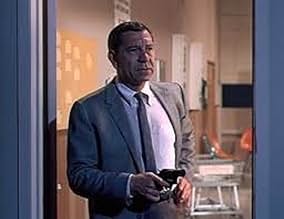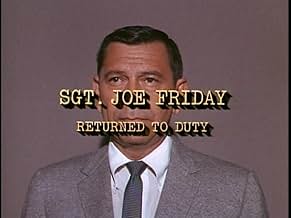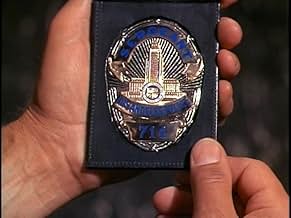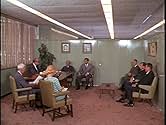After work Joe Friday goes by a laundromat to buy cigarettes. He interrupts a burglar stealing from the coin box, and shots are fired. The burglar dies, and Friday is investigated by the sho... Read allAfter work Joe Friday goes by a laundromat to buy cigarettes. He interrupts a burglar stealing from the coin box, and shots are fired. The burglar dies, and Friday is investigated by the shooting board to see if it is a justified shot.After work Joe Friday goes by a laundromat to buy cigarettes. He interrupts a burglar stealing from the coin box, and shots are fired. The burglar dies, and Friday is investigated by the shooting board to see if it is a justified shot.
Gary Brown
- Officer Paul
- (as Gary Brown)
Ron Burke
- Arthur Ashton
- (uncredited)
- Director
- Writer
- All cast & crew
- Production, box office & more at IMDbPro
8.5227
1
2
3
4
5
6
7
8
9
10
Featured reviews
My favorite Dragnet episode.
Dragnet has been one of my favorite TV programs. I was around age 10 when the old b&w episodes came out in the 1950's. I would sometimes put on a coat and hat, thinking that I was Sgt Friday. When this series was brought back in 1967, in color, I felt these Dragnet episodes were even better. This later series showed more law enforcement professionalism than the old b&w episodes. Actually, the old 1950's b&w episodes showed professionalism, except for the 1954 Dragnet movie where I thought both Friday and Smith showed unprofessional conduct. In any case, both the b&w and color episodes reflected a rather accurate rendition of the attitudes and conduct by law enforcement of both these genres, respectively.
My desire for detail and accuracy and seems to stem primarily from Jack Webb's (Sgt Joe Friday) style or signature. Don't forget, all Dragnet episodes are based on true stories.
In "The Shooting Board" episode, shots are fired. Very unusual for any Dragnet episode. Sgt Friday goes into a laundromat to buy a pack of cigarettes from a vending machine. At this point, Friday surprises a thief trying to slip-wire a coin changer. The surprised burglar fires first, missing Friday. Friday returns fire wounding this suspect who later dies. At first, there is no evidence that Friday fired in self-defense and a shooting board is assembled (routine). Only at the last minute does evidence clearing Friday come to pass in a VERY unusual way.
I believe this TV series has done an excellent job in portraying law enforcement in a positive light.
My desire for detail and accuracy and seems to stem primarily from Jack Webb's (Sgt Joe Friday) style or signature. Don't forget, all Dragnet episodes are based on true stories.
In "The Shooting Board" episode, shots are fired. Very unusual for any Dragnet episode. Sgt Friday goes into a laundromat to buy a pack of cigarettes from a vending machine. At this point, Friday surprises a thief trying to slip-wire a coin changer. The surprised burglar fires first, missing Friday. Friday returns fire wounding this suspect who later dies. At first, there is no evidence that Friday fired in self-defense and a shooting board is assembled (routine). Only at the last minute does evidence clearing Friday come to pass in a VERY unusual way.
I believe this TV series has done an excellent job in portraying law enforcement in a positive light.
Did You Really Need That Last Cigarette, Joe?
Sergeant Joe Friday finds himself in the crosshairs when he fatally shoots a perpetrator in "The Shooting Board," a tense, involving glimpse into the self-policing done by the Los Angeles Police Department after an officer discharges his weapon in the line of duty for any reason.
As he had shown in previous episodes, David Vowell's efficient script outlines Friday's scenario in clear, vivid terms. Working out of homicide with Officer Bill Gannon, both men are exhausted after working long, fruitless hours on an armed robbery case that resulted in the shooting death of a liquor store owner.
Arriving home at 2:30 AM, Friday realizes that he has run out of cigarettes and enters an all-night laundromat he knows has a cigarette vending machine. He sees a young white man (Ron Burke) trying to jimmy open a change machine, and, after Friday identifies himself as a police officer, the young man whips out a pistol and fires one shot at him that misses. Friday returns fire once, hitting the suspect, who flees in the company of a young white woman (Anita Eubank) driving their getaway car.
Following established procedure, Friday reports the incident and undergoes the internal investigation undertaken with the knowledge that the suspect, apprehended with his accomplice, has died from the shot fired by Friday--and if "The Shooting Board" cannot determine that the shooting was justified, Friday will face felony manslaughter charges. This looms as a very real possibility as investigation of the crime scene fails to locate the slug Friday claims the perp had fired at him first.
Compounding the problem is the sole witness's hysterics in seeing Friday, labeling him the murderer, when she is brought into the police station and that the perp's gun, when found in an oil drum, could not reveal either fingerprints or whether it had been fired. However, when the autopsy report states that Friday's slug had been retrieved from the body, there is no indication given to viewers whether residue had been detected to suggest the victim had fired a gun.
Things don't look good for Friday until a fluke discovery--"one for the books," as Lieutenant Danny Bowser (Leonard Stone) remarks--reverses Friday's fortunes, hardly a spoiler as this conclusion had been a foregone one from the start. Instead, "The Shooting Board," for all its solemn earnestness in detailing the rigor the LAPD applies to such a serious matter--with Captain Hugh Brown (Art Ballinger), Friday's and Gannon's superior, getting to make the rousing "to protect and to serve" speech Jack Webb usually delivers--deftly exemplifies the pat copaganda for which "Dragnet" is famous.
But were we to indulge in the sermonizing "Dragnet" does so well, particularly around the impact and consequences of drugs, this episode could have had a different flavor. Sgt. Friday, like Jack Webb, is a cigarette smoker. He lights one coming out of the elevator with Gannon at the start. Having run out, he stops at the laundromat to buy more cigarettes. In a throwaway irony, the cigarette machine there is out of order, but one of the cops responding to his call not only gives him one, he tells Friday to "keep the pack." Friday's "reward" at the conclusion is the gift of a carton of cigarettes.
Could this fatal shooting have been avoided had Joe Friday not been a drug addict? Can you imagine the grilling he would have received?
"Even after working for more than eighteen hours that day, you couldn't just go to bed, could you? You had to have that one last nicotine fix before you did. How irritable, how jangled were your nerves, when you pulled your piece, Friday? You could have called for backup, let some other cops take care of a petty thief stealing a few dollars in coins. No, all those frustrations and dead ends that had needled you, mocked you, goaded you all day were too much for you, and when you couldn't drown them in that rush of nicotine you needed so bad, you got angry, Mister, and there was somebody you could take out your anger on. But even putting a slug in a desperate perp can't give you the same satisfaction as that first pull on a fresh cigarette. It's just a cheap substitute for what you really need, isn't it? You're a slave to King Tobacco, and even after you plugged him, that cigarette machine--your dealer, your master--was out of order. Now you've got to ask yourself, is getting that one last fix for the day worth the life of another human being?" (Full disclosure: This reviewer is an ex-smoker.)
Of course that is fanciful and exaggerated; moreover, tobacco is still legal, and in the 1960s it was still socially acceptable. As always, we have the luxury of hindsight. But look at the legality issue. For example, "Dragnet" quite rightly sermonized against illegal opioids, namely heroin, as a crime and a moral scourge. But decades later, opioids, now legal, caused an ongoing drug-addiction crisis fueled by greedy drug pushers called Big Pharma that went unremarked until it did become a crisis. (Full disclosure: This reviewer works in the health care industry and is aware of the impact the opioid crisis has had.) And today we know the toll tobacco has taken reaches into millions of lives while Big Tobacco fought tooth and nail for decades to oppose any sanctions on its extremely lucrative industry.
Again, "Dragnet" and its viewers couldn't have known this when these episodes first aired. But we watch them retrospectively, and while we shouldn't criticize them from a contemporary perspective, we can put them in perspective based on how times have changed. There is no question that Friday's shooting was justified; "The Shooting Board" focuses on the problems encountered while proving that justification. In that respect, this is an effective, engaging episode even if, as noted above, the conclusion is foregone one, with Friday's shooting victim strictly the MacGuffin to launch the narrative.
Furthermore, Friday could have needed something else before bed; maybe he could have been out of bread, or milk, or coffee (another drug, by the way), and he could have encountered a robber holding up an all-night grocery. But it was cigarettes, a highly addictive product, and this reviewer has to ask, Did you really need that last cigarette, Joe?
REVIEWER'S NOTE: What makes a review "helpful"? Every reader of course decides that for themselves. For me, a review is helpful if it explains why the reviewer liked or disliked the work or why they thought it was good or not good. Whether I agree with the reviewer's conclusion is irrelevant. "Helpful" reviews tell me how and why the reviewer came to their conclusion, not what that conclusion may be. Differences of opinion are inevitable. I don't need "confirmation bias" for my own conclusions. Do you?
As he had shown in previous episodes, David Vowell's efficient script outlines Friday's scenario in clear, vivid terms. Working out of homicide with Officer Bill Gannon, both men are exhausted after working long, fruitless hours on an armed robbery case that resulted in the shooting death of a liquor store owner.
Arriving home at 2:30 AM, Friday realizes that he has run out of cigarettes and enters an all-night laundromat he knows has a cigarette vending machine. He sees a young white man (Ron Burke) trying to jimmy open a change machine, and, after Friday identifies himself as a police officer, the young man whips out a pistol and fires one shot at him that misses. Friday returns fire once, hitting the suspect, who flees in the company of a young white woman (Anita Eubank) driving their getaway car.
Following established procedure, Friday reports the incident and undergoes the internal investigation undertaken with the knowledge that the suspect, apprehended with his accomplice, has died from the shot fired by Friday--and if "The Shooting Board" cannot determine that the shooting was justified, Friday will face felony manslaughter charges. This looms as a very real possibility as investigation of the crime scene fails to locate the slug Friday claims the perp had fired at him first.
Compounding the problem is the sole witness's hysterics in seeing Friday, labeling him the murderer, when she is brought into the police station and that the perp's gun, when found in an oil drum, could not reveal either fingerprints or whether it had been fired. However, when the autopsy report states that Friday's slug had been retrieved from the body, there is no indication given to viewers whether residue had been detected to suggest the victim had fired a gun.
Things don't look good for Friday until a fluke discovery--"one for the books," as Lieutenant Danny Bowser (Leonard Stone) remarks--reverses Friday's fortunes, hardly a spoiler as this conclusion had been a foregone one from the start. Instead, "The Shooting Board," for all its solemn earnestness in detailing the rigor the LAPD applies to such a serious matter--with Captain Hugh Brown (Art Ballinger), Friday's and Gannon's superior, getting to make the rousing "to protect and to serve" speech Jack Webb usually delivers--deftly exemplifies the pat copaganda for which "Dragnet" is famous.
But were we to indulge in the sermonizing "Dragnet" does so well, particularly around the impact and consequences of drugs, this episode could have had a different flavor. Sgt. Friday, like Jack Webb, is a cigarette smoker. He lights one coming out of the elevator with Gannon at the start. Having run out, he stops at the laundromat to buy more cigarettes. In a throwaway irony, the cigarette machine there is out of order, but one of the cops responding to his call not only gives him one, he tells Friday to "keep the pack." Friday's "reward" at the conclusion is the gift of a carton of cigarettes.
Could this fatal shooting have been avoided had Joe Friday not been a drug addict? Can you imagine the grilling he would have received?
"Even after working for more than eighteen hours that day, you couldn't just go to bed, could you? You had to have that one last nicotine fix before you did. How irritable, how jangled were your nerves, when you pulled your piece, Friday? You could have called for backup, let some other cops take care of a petty thief stealing a few dollars in coins. No, all those frustrations and dead ends that had needled you, mocked you, goaded you all day were too much for you, and when you couldn't drown them in that rush of nicotine you needed so bad, you got angry, Mister, and there was somebody you could take out your anger on. But even putting a slug in a desperate perp can't give you the same satisfaction as that first pull on a fresh cigarette. It's just a cheap substitute for what you really need, isn't it? You're a slave to King Tobacco, and even after you plugged him, that cigarette machine--your dealer, your master--was out of order. Now you've got to ask yourself, is getting that one last fix for the day worth the life of another human being?" (Full disclosure: This reviewer is an ex-smoker.)
Of course that is fanciful and exaggerated; moreover, tobacco is still legal, and in the 1960s it was still socially acceptable. As always, we have the luxury of hindsight. But look at the legality issue. For example, "Dragnet" quite rightly sermonized against illegal opioids, namely heroin, as a crime and a moral scourge. But decades later, opioids, now legal, caused an ongoing drug-addiction crisis fueled by greedy drug pushers called Big Pharma that went unremarked until it did become a crisis. (Full disclosure: This reviewer works in the health care industry and is aware of the impact the opioid crisis has had.) And today we know the toll tobacco has taken reaches into millions of lives while Big Tobacco fought tooth and nail for decades to oppose any sanctions on its extremely lucrative industry.
Again, "Dragnet" and its viewers couldn't have known this when these episodes first aired. But we watch them retrospectively, and while we shouldn't criticize them from a contemporary perspective, we can put them in perspective based on how times have changed. There is no question that Friday's shooting was justified; "The Shooting Board" focuses on the problems encountered while proving that justification. In that respect, this is an effective, engaging episode even if, as noted above, the conclusion is foregone one, with Friday's shooting victim strictly the MacGuffin to launch the narrative.
Furthermore, Friday could have needed something else before bed; maybe he could have been out of bread, or milk, or coffee (another drug, by the way), and he could have encountered a robber holding up an all-night grocery. But it was cigarettes, a highly addictive product, and this reviewer has to ask, Did you really need that last cigarette, Joe?
REVIEWER'S NOTE: What makes a review "helpful"? Every reader of course decides that for themselves. For me, a review is helpful if it explains why the reviewer liked or disliked the work or why they thought it was good or not good. Whether I agree with the reviewer's conclusion is irrelevant. "Helpful" reviews tell me how and why the reviewer came to their conclusion, not what that conclusion may be. Differences of opinion are inevitable. I don't need "confirmation bias" for my own conclusions. Do you?
Friday Takes A Shot
I really enjoy this episode. As a rule, you see very few episodes from Dragnet where shots are fired, but this is one of those rare instances.
After an 18-hour shift, Friday and Gannon go their separate ways for a few hours sleep before a new day begins. Friday heads out after arriving home, to grab a pack of cigarettes, at the local Laundromat. Unfortunately, he finds that crime never stops and he surprises a suspect trying to empty a change machine.
Shots are fired and Friday finds himself facing a shooting board because of his actions. The story around the events is very well done as is the entire episode....recommended for any fans of Dragnet or any new-comers to the classic series.
After an 18-hour shift, Friday and Gannon go their separate ways for a few hours sleep before a new day begins. Friday heads out after arriving home, to grab a pack of cigarettes, at the local Laundromat. Unfortunately, he finds that crime never stops and he surprises a suspect trying to empty a change machine.
Shots are fired and Friday finds himself facing a shooting board because of his actions. The story around the events is very well done as is the entire episode....recommended for any fans of Dragnet or any new-comers to the classic series.
Did you know
- TriviaThe Lt. Pierce Brooks in this episode was apparently named after real-life LAPD detective Pierce Brooks who investigated the famous Onion Field murder case.
- GoofsAfter finding the slug one of the shooting team detectives tells Friday that he had the geography figured almost to the inch. He most likely meant geometry, which deals with angles, lines and direction whereas geography almost exclusively deals with terrain features of the Earth.
Details
- Runtime
- 30m
- Sound mix
- Aspect ratio
- 1.33 : 1
Contribute to this page
Suggest an edit or add missing content


















